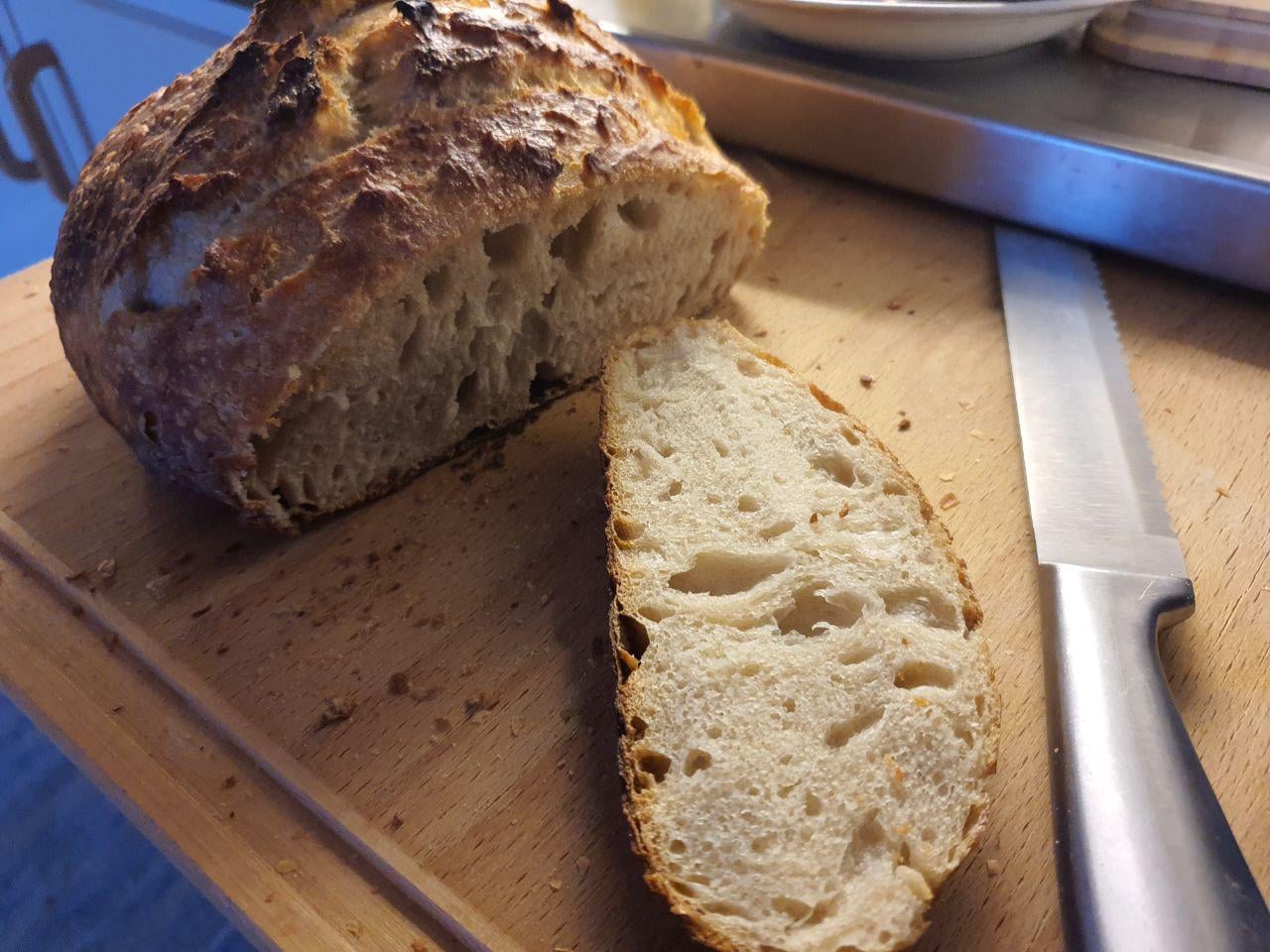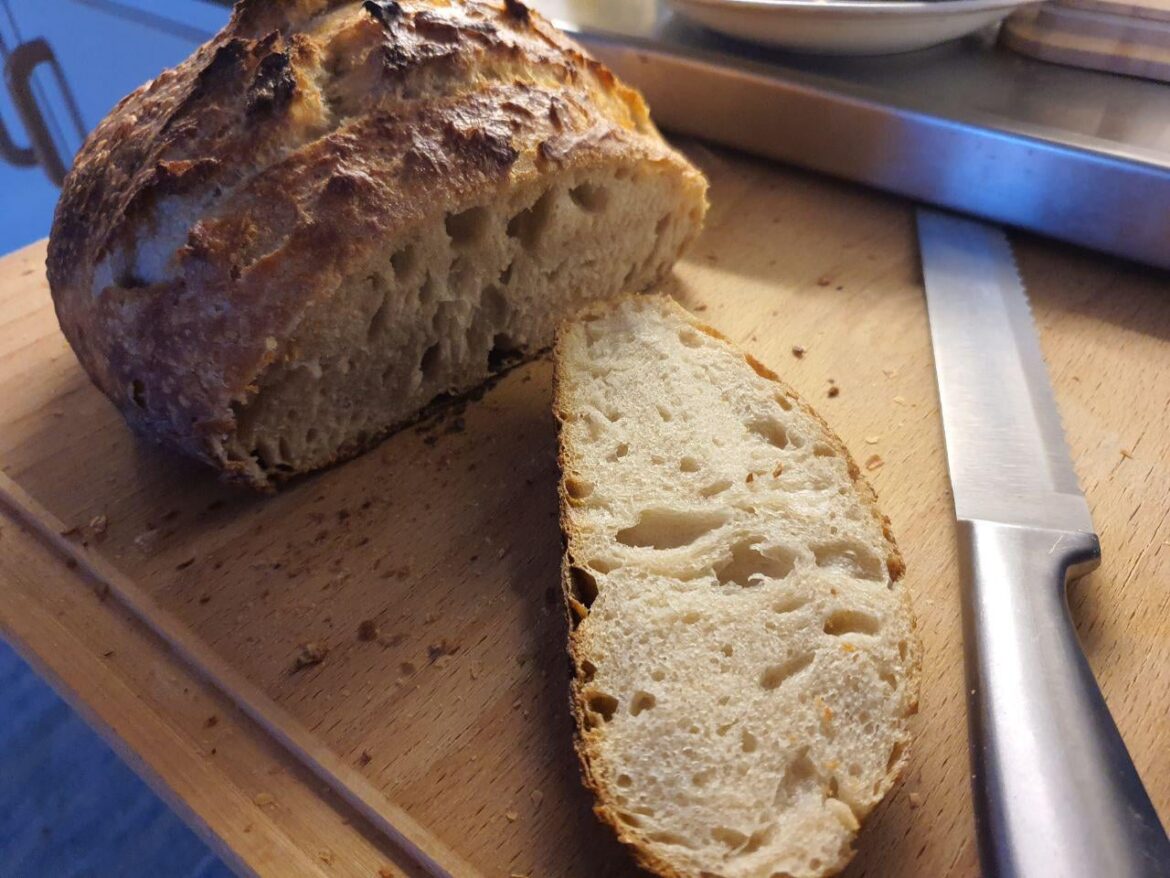
So, i decided to just wing it with this bread and i've never made such an amazing piece of sourdough. I did 5 sets of stretch and folds, let it bulk ferment on the counter overnight, worked with it alot while shaping it, put it in the fridge for maybe an hour before my husband got too eager to try it so i baked it in a dutch oven for 30 minutes on 250°C, and then 15 minutes more without the lid!
It turned out so crispy but also very fluffy, i'm probably eating the whole bread when i get home.
Just your reminder to not overthink things too much! It's supposed to be fun, and a failed loaf isn't the end of the world ☺️
by munkafvinranke


25 Comments
https://preview.redd.it/7hggovghmree1.jpeg?width=1080&format=pjpg&auto=webp&s=40c6dcdf4d52ee0f68ebff8fcbf705a0c5ac5cdb
These are the ingredients, but i didn’t follow the instructions!
65% hydration!
What did you differently from your typical sourdough process?
I don’t even measure the water or flour as well! I eat amazing fresh bread every day without any of the fuss. This sub is can be so over prescriptive. Your bread looks awesome!
So the only thing you changed is you shortened the time in the fridge? That doesn’t seem like much of a change…
I, too, have far more successes “baking by feel” than following a recipe. Heck, I don’t even measure ingredients. I dump an amount of flour that looks like it will make about the size loaf I want. I add just enough water to hydrate at first, mix it in, set it off to the side for about a half hour or until the mixture looks more “together”. When I return, I add a good pinch of salt (maybe a tablespoon?) to warm water and then add that until the dough is workable for me. I’m not confident working with very high hydration, so it’s usually pretty low. I add starter. If I want it to develop fast, I add more starter. If I want it to go slow, I add less. Mix it all together, let it be for a bit. I do stretch and folds whenever I remember for about a 2-3 hour period, or until the dough goes through the cycle of coming together and tightening, then relaxing a bit. I leave it to bulk wherever— if I want it to bulk faster, I find a spot that is a little cozier, and if I want it to take its time (overnight) I put it in a cooler place. When it’s about 1.5-2x its size, I shape and banneton. I cold ferment for 12-36 hours, and when I pull it to bake, I give it a gentle tuck-reshape. Half the time I forget to score. I do cold start method for my bake, so I throw it in a cold (just not preheated) cast iron with a splash of water, cold oven start to 500°F (or however hot my lame oven will get to) and set it for about 45 minutes. If I smell my bread earlier than that, I go uncover and let it crisp/brown for 5-10 min. It’s made some delightful loaves! I’ve also had some flops, for different reasons, like amount of developing time, size of loaf needing a longer bake, or unhealthy starter. Now that I have gotten a healthier starter, I am cruising again!
I’ve had a very hands off approach for years while making sourdough and it’s basically never failed me outside of ambient temperature mistakes that were sometimes out of my control.
I do a single set of folds and turns (about 30 turns) and leave the dough to rise overnight. 30 minute rest after shaping. Never discard. I only cold proof if I’m doing pizza dough.
People absolutely way overcomplicate the entire process. But this isn’t unusual with niche hobbies.
My partner says she read that it’s more important to watch the dough rather than the clock. I’m finding this to be very true. While I get good results, I just left a dough out overnight (it’s 18°C in my kitchen) instead of the 4 hours bulk ferment that was advised.
The boules look more cohesive and stretchy than I’ve managed before while trying to follow the clock. I’m hoping they bake up well!
I’m finding sourdough is very forgiving! Looks amazing
Curious what’s your kitchen temperature? That’s pretty important for dough proofing.
I had a scale blunder a couple days ago and it turned out to be one of my loaves. I added Nutella bc I figured if it went bad it would still have Nutella in it so it won’t be awful…it was perfect lol
That’s one of my favorite things about sourdough. Working with the dough without following a particular method, and just discovering what works best for ✨️ you ✨️
Whenever I get into a rut I go back to a very basic recipe and process. Alot of minimalist hobbies like this tend to skew very heavy handed on do’s and don’ts – it’s not as hard as we make it sometimes
I mean, sure? It depends on what your desired outcome is. Some of us are going for specific outcomes, and baking IS a science. You seem very chill and your bread looks edible, so I’m happy for you.
Does your bread look like what I’m typically trying to achieve? …No.
I’m with you! At the begging I got dizzy trying to figure it out. I watched a bunch of YouTubers and printed recipes . Now I just do it! I don’t even score all the time. Picture of my sandwich onion bread and it turned out pretty good. I fermented the dough on counter for about 5 hours. I always feel lucky when it turns out. ❤️
https://preview.redd.it/0pl8t54njsee1.jpeg?width=3024&format=pjpg&auto=webp&s=2e4c348f7c3bde5f41b2ce9e2cf5dee003cf6aa3
Honestly sourdough has been around for centuries there is no one way to do it, the best thing about it is you can play around and find what works for you
I fully agree with the whole “people make this so much harder than it needs to be“ thing. I’ve never had a bad loaf. I’ve never gotten fancy with it. It’s just bread and I think a lot of people forget that 😂
There is much truth when saying people may overthink things to much, that’s why you should carefully pick the advices you need and the reasoning behind every advice.
It is very difficult to assess what might go wrong in every case. Every single detail matters when comes to sourdough bread.
People here are random bakers, sourdough advocates, experienced bakers, etc with many backgrounds to support their thoughts.
I am happy you nailed your bread, probably your starter and other variables matched your process this time. Try to take notes of all the process (including temperatures) and think what happened in each stage, then you can also help out our community.
kudos again.
underproofed
I forgot about my loaf proofing on a countertop and came back to find it busting out of its cover 6 hours too late
Baked it up and it was fine.
I do appreciate the super technical approach to chasing a specific result. But I needed that reminder that in the end, it’ll eat
Do you guys find stretch and folds that necessary? I wonder sometimes in comparison to regular bread where you leave it alone the whole time
Hi. Well done you! I hope your husband didn’t get there before you😆
A good starter makes up for a lot. i dont even measure anything i eye ball it all and get a good loaf.
In one of my favorite bread books, “The Bread Baker’s Apprentice” by Peter Reinhart, there’s a whole section at the end about this. It describes how the recipes in the book are the process that work best for the author’s environment, but really, as long as you’re using sound baking science, any process will probably make good bread. In fact, slight changes in your recipe make your bread unique to you.
It seems like you’ve found your own system that makes awesome bread, keep it up!
I couldn’t agree with you more about overthinking things. When I get too caught up in the minutia, I try to imagine how things were done by feel and intuition, using a wild organism that somehow worked, for thousands of years.
Today we focus on the science, but for millennia, baking had to be learned very much as an art. Woodburning ovens without thermometers needed to be heated by adding greater or lesser amounts of wood, changing the draft, or adjusting the bake time based on the feel. And speaking of time, before clocks were commonly available, even that would’ve been a more difficult variable to account for.
I think many of us find that sourdough baking can often be much more forgiving than we might imagine, until we make mistakes and find out that things still work out surprisingly well.